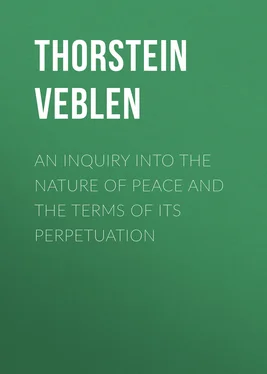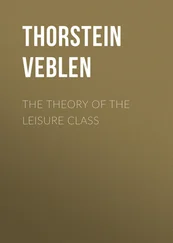Thorstein Veblen - An Inquiry into the Nature of Peace and the Terms of Its Perpetuation
Здесь есть возможность читать онлайн «Thorstein Veblen - An Inquiry into the Nature of Peace and the Terms of Its Perpetuation» — ознакомительный отрывок электронной книги совершенно бесплатно, а после прочтения отрывка купить полную версию. В некоторых случаях можно слушать аудио, скачать через торрент в формате fb2 и присутствует краткое содержание. Жанр: foreign_antique, Политика, Юриспруденция, foreign_edu, на английском языке. Описание произведения, (предисловие) а так же отзывы посетителей доступны на портале библиотеки ЛибКат.
- Название:An Inquiry into the Nature of Peace and the Terms of Its Perpetuation
- Автор:
- Жанр:
- Год:неизвестен
- ISBN:нет данных
- Рейтинг книги:5 / 5. Голосов: 1
-
Избранное:Добавить в избранное
- Отзывы:
-
Ваша оценка:
- 100
- 1
- 2
- 3
- 4
- 5
An Inquiry into the Nature of Peace and the Terms of Its Perpetuation: краткое содержание, описание и аннотация
Предлагаем к чтению аннотацию, описание, краткое содержание или предисловие (зависит от того, что написал сам автор книги «An Inquiry into the Nature of Peace and the Terms of Its Perpetuation»). Если вы не нашли необходимую информацию о книге — напишите в комментариях, мы постараемся отыскать её.
An Inquiry into the Nature of Peace and the Terms of Its Perpetuation — читать онлайн ознакомительный отрывок
Ниже представлен текст книги, разбитый по страницам. Система сохранения места последней прочитанной страницы, позволяет с удобством читать онлайн бесплатно книгу «An Inquiry into the Nature of Peace and the Terms of Its Perpetuation», без необходимости каждый раз заново искать на чём Вы остановились. Поставьте закладку, и сможете в любой момент перейти на страницу, на которой закончили чтение.
Интервал:
Закладка:
It is also evident from the run of the facts as exemplified in these modern wars that while any breach of the peace takes place only on the initiative and at the discretion of the government, or State, 1 1 A modern nation constitutes a State only in respect of or with ulterior bearing on the question of International peace or war.
it is always requisite in furtherance of such warlike enterprise to cherish and eventually to mobilise popular sentiment in support of any warlike move. Due fomentation of a warlike animus is indispensable to the procuring and maintenance of a suitable equipment with which eventually to break the peace, as well as to ensure a diligent prosecution of such enterprise when once it has been undertaken. Such a spirit of militant patriotism as may serviceably be mobilised in support of warlike enterprise has accordingly been a condition precedent to any people's entry into the modern Concert of Nations. This Concert of Nations is a Concert of Powers, and it is only as a Power that any nation plays its part in the concert, all the while that "power" here means eventual warlike force.
Such a people as the Chinese, e.g., not pervaded with an adequate patriotic spirit, comes into the Concert of Nations not as a Power but as a bone of contention. Not that the Chinese fall short in any of the qualities that conduce to efficiency and welfare in time of peace, but they appear, in effect, to lack that certain "solidarity of prowess" by virtue of which they should choose to be (collectively) formidable rather than (individually) fortunate and upright; and the modern civilised nations are not in a position, nor in a frame of mind, to tolerate a neighbor whose only claim on their consideration falls under the category of peace on earth and good-will among men. China appears hitherto not to have been a serviceable people for warlike ends, except in so far as the resources of that country have been taken over and converted to warlike uses by some alien power working to its own ends. Such have been the several alien dynasties that have seized upon that country from time to time and have achieved dominion by usufruct of its unwarlike forces. Such has been the nature of the Manchu empire of the recent past, and such is the evident purpose of the prospective Japanese usufruct of the same country and its populace. Meantime the Chinese people appear to be incorrigibly peaceable, being scarcely willing to fight in any concerted fashion even when driven into a corner by unprovoked aggression, as in the present juncture. Such a people is very exceptional. Among civilised nations there are, broadly speaking, none of that temper, with the sole exception of the Chinese,—if the Chinese are properly to be spoken of as a nation.
Modern warfare makes such large and direct use of the industrial arts, and depends for its successful prosecution so largely on a voluminous and unremitting supply of civilian services and wrought goods, that any inoffensive and industrious people, such as the Chinese, could doubtless now be turned to good account by any warlike power that might have the disposal of their working forces. To make their industrial efficiency count in this way toward warlike enterprise and imperial dominion, the usufruct of any such inoffensive and unpatriotic populace would have to fall into the hands of an alien governmental establishment. And no alien government resting on the support of a home population trained in the habits of democracy or given over to ideals of common honesty in national concerns could hopefully undertake the enterprise. This work of empire-building out of unwarlike materials could apparently be carried out only by some alien power hampered by no reserve of scruple, and backed by a servile populace of its own, imbued with an impeccable loyalty to its masters and with a suitably bellicose temper, as, e.g., Imperial Japan or Imperial Germany.
However, for the commonplace national enterprise the common run will do very well. Any populace imbued with a reasonable measure of patriotism will serve as ways and means to warlike enterprise under competent management, even if it is not habitually prone to a bellicose temper. Rightly managed, ordinary patriotic sentiment may readily be mobilised for warlike adventure by any reasonably adroit and single-minded body of statesmen,—of which there is abundant illustration. All the peoples of Christendom are possessed of a sufficiently alert sense of nationality, and by tradition and current usage all the national governments of Christendom are warlike establishments, at least in the defensive sense; and the distinction between the defensive and the offensive in international intrigue is a technical matter that offers no great difficulty. None of these nations is of such an incorrigibly peaceable temper that they can be counted on to keep the peace consistently in the ordinary course of events.
Peace established by the State, or resting in the discretion of the State, is necessarily of the nature of an armistice, in effect terminable at will and on short notice. It is maintained only on conditions, stipulated by express convention or established by custom, and there is always the reservation, tacit or explicit, that recourse will be had to arms in case the "national interests" or the punctilios of international etiquette are traversed by the act or defection of any rival government or its subjects. The more nationally-minded the government or its subject populace, the readier the response to the call of any such opportunity for an unfolding of prowess. The most peaceable governmental policy of which Christendom has experience is a policy of "watchful waiting," with a jealous eye to the emergence of any occasion for national resentment; and the most irretrievably shameful dereliction of duty on the part of any civilised government would be its eventual insensibility to the appeal of a "just war." Under any governmental auspices, as the modern world knows governments, the keeping of the peace comes at its best under the precept, "Speak softly and carry a big stick." But the case for peace is more precarious than the wording of the aphorism would indicate, in as much as in practical fact the "big stick" is an obstacle to soft speech. Evidently, in the light of recent history, if the peace is to be kept it will have to come about irrespective of governmental management,—in spite of the State rather than by its good offices. At the best, the State, or the government, is an instrumentality for making peace, not for perpetuating it.
Anyone who is interested in the nature and derivation of governmental institutions and establishments in Europe, in any but the formal respect, should be able to satisfy his curiosity by looking over the shoulders of the professed students of Political Science. Quite properly and profitably that branch of scholarship is occupied with the authentic pedigree of these institutions, and with the documentary instruments in the case; since Political Science is, after all, a branch of theoretical jurisprudence and is concerned about a formally competent analysis of the recorded legal powers. The material circumstances from which these institutions once took their beginning, and the exigencies which have governed the rate and direction of their later growth and mutation, as well as the de facto bearing of the institutional scheme on the material welfare or the cultural fortunes of the given community,—while all these matters of fact may be germane to the speculations of Political Theory, they are not intrinsic to its premises, to the logical sequence of its inquiry, or to its theoretical findings. The like is also true, of course, as regards that system of habits of thought, that current frame of mind, in which any given institutional scheme necessarily is grounded, and without the continued support of which any given scheme of governmental institutions or policy would become nugatory and so would pass into the province of legal fiction. All these are not idle matters in the purview of the student of Political Science, but they remain after all substantially extraneous to the structure of political theory; and in so far as matters of this class are to be brought into the case at all, the specialists in the field can not fairly be expected to contribute anything beyond an occasional obiter dictum . There can be no discourteous presumption, therefore, in accepting the general theorems of current political theory without prejudice, and looking past the received theoretical formulations for a view of the substantial grounds on which the governmental establishments have grown into shape, and the circumstances, material and spiritual, that surround their continued working and effect.
Читать дальшеИнтервал:
Закладка:
Похожие книги на «An Inquiry into the Nature of Peace and the Terms of Its Perpetuation»
Представляем Вашему вниманию похожие книги на «An Inquiry into the Nature of Peace and the Terms of Its Perpetuation» списком для выбора. Мы отобрали схожую по названию и смыслу литературу в надежде предоставить читателям больше вариантов отыскать новые, интересные, ещё непрочитанные произведения.
Обсуждение, отзывы о книге «An Inquiry into the Nature of Peace and the Terms of Its Perpetuation» и просто собственные мнения читателей. Оставьте ваши комментарии, напишите, что Вы думаете о произведении, его смысле или главных героях. Укажите что конкретно понравилось, а что нет, и почему Вы так считаете.












